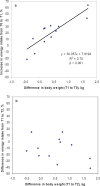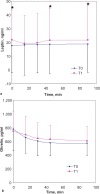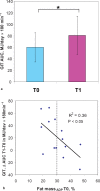Influence of partial sleep deprivation on energy balance and insulin sensitivity in healthy women
- PMID: 20054188
- PMCID: PMC6515888
- DOI: 10.1159/000158874
Influence of partial sleep deprivation on energy balance and insulin sensitivity in healthy women
Abstract
Background: Voluntary sleep restriction is a lifestyle feature of modern societies that may contribute to obesity and diabetes. The aim of the study was to investigate the impact of partial sleep deprivation on the regulation of energy balance and insulin sensitivity.
Subjects and methods: In a controlled intervention, 14 healthy women (age 23-38 years, BMI 20.0-36.6 kg/m(2)) were investigated after 2 nights of >8 h sleep/night (T0), after 4 nights of consecutively increasing sleep curtailment (7 h sleep/night, 6 h sleep/night, 6 h sleep/night and 4 h sleep/night; T1) and after 2 nights of sleep recovery (>8 h sleep/night; T2). Resting and total energy expenditure (REE, TEE), glucose-induced thermogenesis (GIT), physical activity, energy intake, glucose tolerance and endocrine parameters were assessed.
Results: After a decrease in sleep du-ration, energy intake (+20%), body weight (+0.4 kg), leptin/fat mass (+29%), free triiodothyronine (+19%), free thyroxine (+10%) and GIT (+34%) significantly increased (all p < 0.05). Mean REE, physical activity, TEE, oral glucose tolerance, and ghrelin levels remained unchanged at T1. The effect of sleep loss on GIT, fT3 and fT4 levels was inversely related to fat mass.
Conclusion: Short-term sleep deprivation increased energy intake and led to a net weight gain in women. The effect of sleep restriction on energy expenditure needs to be specifically addressed in future studies using reference methods for total energy expenditure.
Figures




Similar articles
-
Partial sleep deprivation and energy balance in adults: an emerging issue for consideration by dietetics practitioners.J Acad Nutr Diet. 2012 Nov;112(11):1785-97. doi: 10.1016/j.jand.2012.07.032. J Acad Nutr Diet. 2012. PMID: 23102177 Review.
-
Acute sleep deprivation reduces energy expenditure in healthy men.Am J Clin Nutr. 2011 Jun;93(6):1229-36. doi: 10.3945/ajcn.110.006460. Epub 2011 Apr 6. Am J Clin Nutr. 2011. PMID: 21471283 Clinical Trial.
-
A single night of partial sleep deprivation induces insulin resistance in multiple metabolic pathways in healthy subjects.J Clin Endocrinol Metab. 2010 Jun;95(6):2963-8. doi: 10.1210/jc.2009-2430. Epub 2010 Apr 6. J Clin Endocrinol Metab. 2010. PMID: 20371664
-
Effects of experimental sleep restriction on caloric intake and activity energy expenditure.Chest. 2013 Jul;144(1):79-86. doi: 10.1378/chest.12-2829. Chest. 2013. PMID: 23392199 Free PMC article. Clinical Trial.
-
The role of sleep duration in the regulation of energy balance: effects on energy intakes and expenditure.J Clin Sleep Med. 2013 Jan 15;9(1):73-80. doi: 10.5664/jcsm.2348. J Clin Sleep Med. 2013. PMID: 23319909 Free PMC article. Review.
Cited by
-
Sleep duration and the risk of new-onset arthritis in middle-aged and older adult population: results from prospective cohort study in China.Front Public Health. 2024 May 30;12:1321860. doi: 10.3389/fpubh.2024.1321860. eCollection 2024. Front Public Health. 2024. PMID: 38873298 Free PMC article.
-
Short Sleep Duration Disrupts Glucose Metabolism: Can Exercise Turn Back the Clock?Exerc Sport Sci Rev. 2024 Jul 1;52(3):77-86. doi: 10.1249/JES.0000000000000339. Epub 2024 Apr 12. Exerc Sport Sci Rev. 2024. PMID: 38608214 Review.
-
Late, but Not Early, Night Sleep Loss Compromises Neuroendocrine Appetite Regulation and the Desire for Food.Nutrients. 2023 Apr 23;15(9):2035. doi: 10.3390/nu15092035. Nutrients. 2023. PMID: 37432152 Free PMC article. Clinical Trial.
-
Effect of sleep restriction on insulin sensitivity and energy metabolism in postmenopausal women: A randomized crossover trial.Obesity (Silver Spring). 2023 May;31(5):1204-1215. doi: 10.1002/oby.23739. Epub 2023 Mar 30. Obesity (Silver Spring). 2023. PMID: 36998155 Free PMC article. Clinical Trial.
-
Role of Circadian Clock on the Pathogenesis and Lifestyle Management in Non-Alcoholic Fatty Liver Disease.Nutrients. 2022 Nov 27;14(23):5053. doi: 10.3390/nu14235053. Nutrients. 2022. PMID: 36501083 Free PMC article. Review.
References
-
- Flegal KM, Carroll MD, Ogden CL, Johnson CL. Prevalence and trends in obesity among US adults1999–2000. JAMA. 2002;288:1723–1727. - PubMed
-
- Von Kries R, Toschke, AM, Wurmser H, Sauerwald T, Koletzko B. Reduced risk for overweight and obesity in 5- and 6-y-old children by duration of sleep – a cross sectional study. Int J Obes Relat Metab Disord. 2002;26:710–716. - PubMed
-
- Sekine MYamagami T, Handa K, Saito T, Nanri S, Kawaminami K, Tokui N, Yoshida K, Kagamimori S. A dose-response relationship between short sleeping hours and childhood obesity: results of the Toyama Birth Cohort Study. Child Care Health Dev. 2002;28:163–170. - PubMed
-
- Ayas NT, White DP, Al-Delaimy WK, Manson JE, Stampfer MJ, Speizer FE, Patel S, Hu FB. A prospective study of self-reported sleep duration and incident diabetes in women. Diabetes Care. 2003;26:380–384. - PubMed
MeSH terms
Substances
LinkOut - more resources
Full Text Sources
Medical


